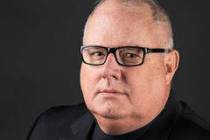Aging utilities, soaring costs pose challenges
Boulder City is facing difficult decisions concerning our utility system. Unlike most Nevada cities, we own and operate our own utilities. That’s one of the main reasons why our utility rates have traditionally been so much lower than those in neighboring communities.
For instance, according to a 2014 water rate study conducted by the Las Vegas Valley Water District, our average monthly water bill was the lowest of all 62 West and Southwest cities surveyed. In fact, it was almost 60 percent less than the 62-city average and over 75 percent less than the most expensive cities. That’s a huge blessing and a nice luxury.
However, it simply isn’t sustainable.
Our water rates don’t even come close to covering the water utility’s annual operating expenses. And although our electric and sewer rates normally do cover their own operating expenses, they’ll barely make a dent in the estimated $45 million needed to start replacing our outdated electrical system, and the additional $40 million required to keep up with water and sewer system projects, over the next 10 years.
Then there’s an estimated $30 million more to get adequate utility infrastructure to the planned light industrial center near Railroad Pass if we hope to take advantage of significant revenue-generating opportunities as Interstate 11 nears completion.
Kicking the can down the road or sweeping the issues under the carpet isn’t the answer. If we do nothing, then the risk of systemwide failures, compromised safety, skyrocketing maintenance costs and even a bankrupt utility fund only gets worse.
We’ve been hearing for years from Electric Utility Administrator Rory Dwyer and others responsible for public safety and emergency response that Boulder City’s electrical system is highly unreliable, difficult and expensive to maintain, unsafe, and lacks necessary redundancy, creating a high risk of blanket or even citywide power outages over extended time periods. Science Applications International Corp.’s 2012 electrical system assessment concluded the same thing.
Who can put a price tag on the costs to residents and businesses alike if we experience a major electrical system failure or if someone gets hurt?
We simply can’t ignore our desperate utility needs any longer. The only real issue is how to pay for them.
The most obvious way would be to simply increase utility rates. That’s precisely what EES Consulting’s recent rate study urges. In fact, EES recommends immediately increasing water rates by 54 percent, sewer rates by almost 75 percent over a three-year period and electric rates by almost 28 percent over a four-year period.
By my rough calculations, that would increase my family’s total utility bill by about 35 percent by 2020 (making me a very unpopular guy even in my own household). The alternative, though, according to EES, is even larger increases spread over a slightly longer period.
Do we have other options besides rate increases? Yes, a few. For instance, other potential funding sources include: (1) accelerating existing debt payments to free up more money in the utility fund; (2) incurring more debt; (3) requesting voter approval to tap further into the capital improvement fund as those funds become available through city land sales and leases; and (4) seeking help from developers. However, those alternatives won’t alone solve our utility problems, and each comes with its own set of drawbacks that have to be considered. So the reality is that, barring an unexpected windfall to the city, some form of rate increases is probably inevitable in the very near future.
Seeing our utility bills increase by a third or more over the next 3-5 years probably isn’t the end of the world. In fact, our utility rates would still be far below many of our sister cities in the West. Nevertheless, I assure you that the City Council is committed to keeping rates as low as reasonably possible. And we’re working hard to find ways to mitigate the impacts on all of us and our pocketbooks.
You can help by participating with us as we work through the issues. And you can also vote for any ballot questions that seek approval of other funding sources, just like you did in recent years when we sought approval to use golf course land sale revenues and capital improvement plan funds.
Thank you once again for your continued support as we work together to find viable solutions to difficult issues like these.
Rod Woodbury is mayor of Boulder City. He has been serving on the City Council since 2011 and is the president and managing shareholder of his law firm, Woodbury Law.











